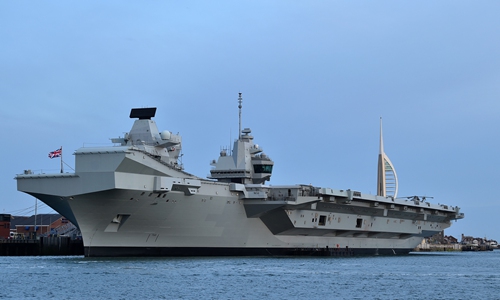
The HMS Queen Elizabeth aircraft carrier is pictured at anchor on the Solent, following an event to commemorate the 75th anniversary of the D-Day landings, in Portsmouth, southern England, on June 5, 2019. Photo: AFP
As a UK aircraft carrier task force left the South China Sea on Monday after only a week in the region, apparently without making provocative moves on China like UK reports previously claimed, a German warship reportedly set sail for a tour to the Indo-Pacific Region on the same day, eyeing a transit in the South China Sea without confronting China, and a port visit in Shanghai.
Despite the US' attempts to rally Western countries to join forces in the South China Sea to besiege China, both the UK and Germany are seeking a balance, as the UK carrier hurried its exit from the region because it understood China's red lines and military capability, while Germany does not want to confront China in the first place, Chinese experts said on Monday.
The UK aircraft carrier task force led by the HMS Queen Elizabeth carrier sailed through the Luzon Strait and into the Philippine Sea on Monday, after passing through the Strait of Malacca into the South China Sea on July 27, according to the carrier's official Twitter account.
At least one warship of the Chinese People's Liberation Army (PLA) tracked the UK carrier group as it departed the South China Sea via waters near the Dongsha Islands and the Bashi Strait south to the island of Taiwan from Sunday to Monday, Taiwan-based media reported on Monday.
Previous reports by UK media said the carrier would challenge China by transiting "international waters claimed by China" in the South China Sea, but no such incident had been reported as of press time.
The UK carrier's restrained and short voyage to the South China Sea showed that the country maintains a balance between China and its ally the US, Wang Yiwei, director of the institute of international affairs at the Renmin University of China in Beijing, told the Global Times on Monday.
It apparently did not step on China's bottom lines - crossing the Taiwan Straits or going within 12 nautical miles of Chinese islands and reefs in the South China Sea, to challenge China's sovereignty, Wang said. "The UK knows that China is powerful enough to drive it away, and the country also learned the lessons from the Amethyst Incident in 1949."
Also on Monday, the German frigate Bayern was expected to set out from the country for a tour to the Indo-Pacific region, German media reported on Sunday.
Unlike the UK carrier's tour, which was once hyped to provoke China, the German warship will not behave confrontationally in the South China Sea or sail within 12 nautical miles of Chinese islands and reefs. Instead, it requested a Shanghai port visit, which has not yet received a response from China, reports quoted German officials as saying.
Unlike the UK, which came to the South China Sea to boost its strategic role of "Global Britain" after Brexit, Germany is acting more on behalf of Europe to seek a long-term maritime order and maintain a certain contact with China, but not confrontationally, Wang said.
The potential port visit seems to be friendly, sending a signal that the frigate came not for confrontation, but to enhance communication, transparency and mutual trust with China. In that way, the frigate would be welcomed, Wang said.
But China may still be holding back on a response to the visit request before figuring out the real purpose of the visit, he noted.




